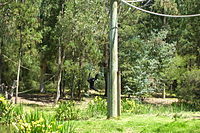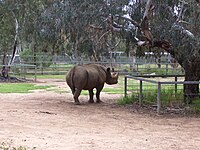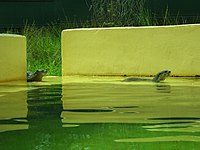Taronga Western Plains Zoo
| Taronga Western Plains Zoo | |
|---|---|
 Taronga Western Plains Zoo Logo | |
 | |
| 32°16′18.8″S 148°35′14″E / 32.271889°S 148.58722°E | |
| Date opened | 28 February 1977 |
| Location | Dubbo, New South Wales, Australia |
| Land area | 300 ha (741 acres) |
| No. of animals | over 1,000 |
| No. of species | 97 |
| Major exhibits | 45 |
| Website | www |
Taronga Western Plains Zoo, formerly known as (and still commonly referred to as) Western Plains Zoo and commonly known as Dubbo Zoo, is a large zoo near Dubbo, New South Wales, Australia. It opened to the public on 28 February 1977,[1] to provide more living and breeding space for large animals such as elephants and antelopes which needed more space than was available at the restricted Sydney site. The zoo is run by the Taronga Conservation Society (formerly Zoological Parks Board of New South Wales), along with Taronga Zoo. Western Plains Zoo is located on the Newell Highway in west Dubbo about 4 km from the city.
History
In the late 1960s, plans to develop a large plains zoo to complement Sydney’s Taronga Zoo were established. The new zoo would provide breeding facilities particularly suited to the large plains dwelling animals and to fulfil a need for an open range facility for the display of mainly grazing animals. After considerable planning and preparation, a site on the outskirts of Dubbo in central West New South Wales was chosen. Formerly an army camp during World War Two, the site was transformed into a 300 hectare zoo of woodland and irrigated grasslands.
Western Plains Zoo opened to the public on 28 February 1977. When the zoo opened, it contained 35 different animals from six countries. The zoo is an open-range design, with walls and fences replaced by concealed moats which divide the animals from the visitors. This creates the impression of actually being with the animals in the wild. It was also the first zoo to be built in Australia in 60 years.
Queen Elizabeth II visited the Western Plains Zoo in 1992.[2]
In 1994 Western Plains Zoo was awarded as the Best Major Tourist Attraction, the highest honour in Australian Tourism.
On 26 September 2006, The Daily Liberal published an article announcing British comedian John Cleese was visiting the zoo "in order to raise money for a new Greater One-Horned rhino exhibit".[3]
Name change
The zoo changed its name to Taronga Western Plains Zoo on 21 January 2008, citing the need to draw attention to the work of the Taronga Conservation Society Australia.[4]
Zoo friends
Zoo Friends was an organisation which offered support in form of volunteers and fund raising for both Taronga Zoo and Western Plains Zoo. Members were eligible to volunteer to help at the Zoo. In 2009 the organisation was disbanded and all assets donated to the Taronga Conservation Foundation. Taronga Zoo now runs its own volunteer program.
Animal listing
Free-ranging animals
Primate islands

Africa


- Cape hunting dog
- Black rhinoceros
- Scimitar oryx
- Transvaal lion
- Dromedary camel
- Ostrich
- Barbary sheep
- Rothschild's giraffe
- Common hippopotamus
- Southern white rhinoceros
- Grant's zebra
- South African cheetah
- Forest buffalo
- African elephant
- Bongo
- Sitatunga
Asia


- Persian onager
- Asian elephant
- Sumatran tiger
- Indian rhinoceros
- Asiatic water buffalo
- Asian small-clawed otter
- Sambar deer
- Banteng
- Nilgai
- Indian antelope
- Chital deer
- Fallow deer
- Elk
- Przewalski's horse
North America
Australia
- Emu
- Red-necked wallaby
- Koala
- Wedge-tailed eagle
- Red kangaroo
- Dingo
- Western grey kangaroo
- Swamp wallaby
- Whiptail wallaby
- Eastern wallaroo
- Yellow-footed rock wallaby
- Tasmanian devil
South America
Children's zoo

- Slender-tailed meerkat
- Malleefowl
- Short-beaked echidna
- Peaceful dove
- Common wombat
- Common blue-tongue lizard
See also
- Jim Lacey - General manager of the Western Plains Zoo from 1988 until 1992.[2]
- Taronga Zoo
Notes and references
- ^ Zoological Parks Board of New South Wales (12 May 2008). "Our History". Taronga Conservation Society Australia. Taronga Western Plains Zoo. Archived from the original on 7 October 2009. Retrieved 22 March 2010.
{{cite web}}: Unknown parameter|deadurl=ignored (|url-status=suggested) (help) - ^ a b North, Bill (18 February 2008). "Death of zoo pioneer". Daily Liberal. Retrieved 21 February 2008.
- ^ "Guess Who's Coming to Dubbo?". Daily Liberal. Archived from the original on 12 March 2008. Retrieved 26 September 2006.
- ^ Hunstdale, Justin (21 January 2008). "Western Plains Zoo name change". Australian Broadcasting Corporation. Retrieved 25 January 2008.
